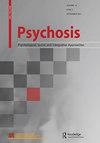心理健康专业人员对听声群体的态度与认知
IF 1
4区 医学
Q4 PSYCHIATRY
Psychosis-Psychological Social and Integrative Approaches
Pub Date : 2021-07-05
DOI:10.1080/17522439.2021.1936142
引用次数: 1
摘要
摘要背景提出了一项倡议,将当地的听声音团体纳入法定成人心理健康服务的特定NHS信托。这项服务评估的目的是评估临床医生对小组的态度和理解,以便更好地为提案提供信息。方法对NHS多学科工作人员进行对听声小组的态度和了解情况的调查。这项调查是与有幻听经历的人以及当地的精神卫生专业人员共同制作的。内容分析用于分析调查中附加的免费文本部分的定性数据。结果40名心理健康专业人员参与了调查。在所有与听声小组的感知利益相关的项目上,大多数人都同意(bbb50 %同意)。调查结果还表明,只有25%的答复者认为他们了解听声小组的证据基础,只有30%的答复者有信心向服务用户解释听声小组。数据表明,大多数心理健康专业人员对听声团体持积极态度。然而,许多人对证据基础表示不确定,并与服务使用者讨论了这些群体,强调在这些领域需要进一步的培训。本文章由计算机程序翻译,如有差异,请以英文原文为准。
Mental health professionals’ attitudes and knowledge about hearing voices groups
ABSTRACT Background An initiative was proposed to integrate local Hearing Voices Groups within statutory adult mental health services in a particular NHS Trust. The aim of this service evaluation was to assess clinician’s attitudes towards, and understandings, of the groups to better inform the proposal. Methods Multi-disciplinary NHS staff members were invited to participate in a brief survey on their attitudes towards and understanding about Hearing Voices Groups. The survey was co-produced with people with lived experience of hearing voices, and local mental health professionals. Content analysis was used to analyse qualitative data from an additional free text section of the survey. Results Forty mental health professionals responded to the survey. There was majority agreement (>50% agreement) on all items related to perceived benefit of Hearing Voices Groups. The findings also showed that only 25% of respondents felt that they were aware of the evidence base for Hearing Voices Groups and only 30% felt confident explaining Hearing Voices Groups to service users. Discussion The data suggest that the majority of mental health professionals hold positive attitudes towards Hearing Voices Groups. However, many expressed uncertainty about the evidence base and discussing the groups with service users, highlighting further training needs in these areas.
求助全文
通过发布文献求助,成功后即可免费获取论文全文。
去求助
来源期刊
CiteScore
2.20
自引率
8.30%
发文量
36

 求助内容:
求助内容: 应助结果提醒方式:
应助结果提醒方式:


